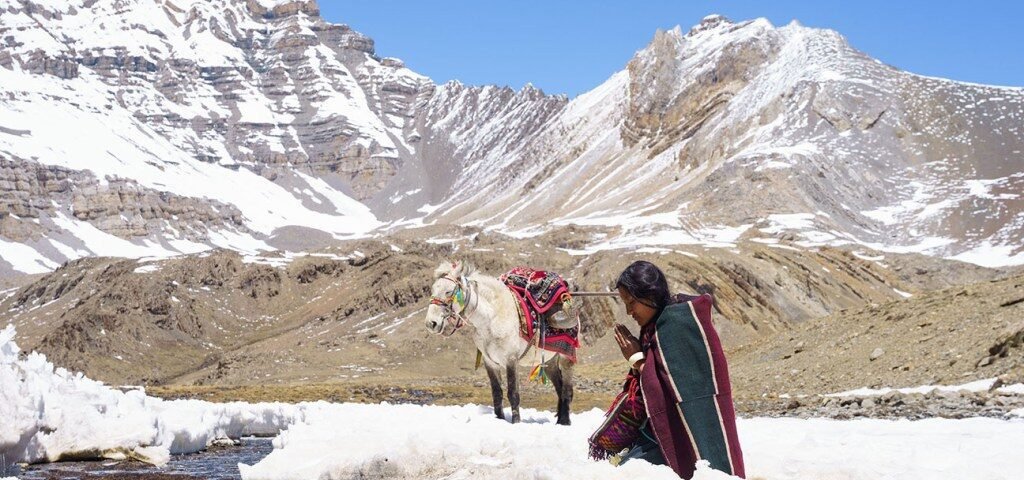


‘Sons’ Review: Sidse Babett Knudsen Is Remarkable as an Avenging Corrections Officer in a Plausibility-Challenged Drama
March 8, 2024


‘Preconceived’ Review: Illuminating Debut Doc Peeks Behind the Curtain of Crisis Pregnancy Centers
March 10, 2024Writer-director Min Bahadur Bham’s second feature follows a newlywedded woman who crosses the Himalayas in search of her fleeing husband.
Shambhala
Powerful if you have the patience.
The main title card for Shambhala, the new drama from Nepalese director Min Bahadur Bham (The Black Hen), appears about an hour into the movie. That’s more or less the same time it takes for the story to truly come alive, in a languishing 150-minute narrative that could prove a real patience-tester for many viewers.
At once intimate and epic, and often more ethnographic than dramatic, Shambhala takes us to the Himalayas to follow a young bride, Pema (Thinely Lhamo), whose husband, Tashi (Tenzin Dalha), leaves her behind for several months and then winds up disappearing altogether. The hitch is that Tashi is actually one of three husbands in a polyandrous marriage that also includes his brothers Karma (Sonam Topden) and Dawa (Karma Wangyal Gurung), although for now Pema is only with Tashi.
During the film’s more memorable moments — and there are a few — it eschews regular storytelling altogether to focus on the customs and rituals of Pema’s people, who live in villages up to 6,000 meters above sea level, with no real connections to the modern world. If it weren’t for the digital watch hidden under Tashi’s ancestral garb, or the fact that the feisty young Dawa wants to grow up and become an airline pilot one day, the drama could have taken place anytime during the last few centuries, so much is it steeped in traditions that seem to have remained unchanged.
Those traditions can be fascinating to watch, with cinematographer Aziz Zhambakiyiv documenting them in extended takes and lush widescreen compositions, his camera roving back and forth to capture an entire ceremony in a single shot. There’s a scene late in the film in which Pema — who still hasn’t tracked down Tashi — plays guitar while Karma, who’s a practicing Buddhist, sings along. It’s a beautiful and stirring moment that arrives far too late in a narrative that takes plenty of time to unravel.
After happily marrying Tashi and his two bros, Pema moves into their home to cook and clean, but soon finds herself alone after Tashi leaves on a long trading voyage to Lhasa. She’s forced to take care of the undisciplined Dawa and winds up getting close with his schoolteacher, Ram Sir (Karma Shakya). Perhaps too close, because she becomes pregnant, and a rumor spreads around the village that Ram Sir is the father, prompting Tashi to abandon his trip back home and set off for parts unknown.
The film does have something to say about patriarchal Nepalese culture, in which women like Pema are obliged to defend their virtue against accusations by their husbands. At one point on their journey, Pema and Karma pass by a village where another woman accused of adultery is forced to shoot an arrow at a bullseye in order to prove her innocence. It’s an impossible feat, and we learn later on that she committed suicide.
Bham contrasts those archaic rituals with the Tibetan Buddhist ceremonies that Karma and other monks partake in, revealing a spiritual path that lies outside the strict social guidelines of the community (the term Shambhala refers to a spiritual kingdom or paradise). By the end of the movie, Pema may be on that path herself, although it took both her and us an awfully long time to get there. It’s as if Bham were conditioning the viewer for the type of patient, trance-like experience needed to reach a deeper level of being — an experience that’s not easy to sit through, but does offers its own kind of enlightenment.





